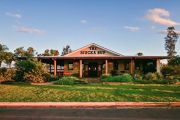
Can Dexus walk both sides of the street?
Perhaps the investors in the $7.7 billion Dexus property group will see the irony in its current predicament over a key stake in Melbourne Airport.
For five years Dexus has been marked down because of its exposure to office towers, and despite a pivot to “real assets management”.
Now, as the office towers stabilise and begin to show upside, Dexus is being marked down again, this time for its exposure to infrastructure and funds management.
The irony also raises questions about two key themes of Australian property.
Every owner, or so it seems, wants to be a fund manager. It lightens the capital load, boosts the return on equity, and follows the success of fund managers like Charter Hall and Goodman.
The other theme is the supposed synergy between real estate and infrastructure, with many institutions merging the two into new ‘real asset’ portfolios.
Both are harder to make work than many imagine.
Dexus combines both themes with an ambition “to be globally recognised as Australasia’s leading real asset manager”.
It underlined the aspiration in 2023 with the acquisition of most of the managements of AMP’s real estate and local infrastructure funds.
Executing the ambition is now the big challenge for Dexus chairman, Warwick Negus, and his chief executive, Ross Du Vernet, who succeeded the high-profile and long-serving Darren Steinberg 14 months ago.
First to recap. As part of the AMP deal, Dexus became the trustee/manager for a number of investors and investment vehicles which together hold 27 per cent of Australia Pacific Airports Corporation (APAC) which in turn owns Melbourne Airport – one of the top infrastructure investments in the country – and Launceston Airport.
A recent move by Dexus to exit some investors and introduce others to the stake has resulted in a raft of legal actions with the other APAC investors aiming to compulsorily acquire the Dexus stake and some Dexus investors taking action to stay.
In a note, JP Morgan reported that the APAC stake produced around $15 million of funds management earnings for Dexus, equivalent to around 10 per cent of the group’s third party management income, or around 2 per cent of the group’s key metric, Funds From Operations.
“This is further bad news on its funds management business and may impact on its reputation, which may pose further pressure on other mandates and its ability to win new money, in our view,” JP Morgan wrote.
The dispute follows the loss by the Dexus Wholesale Shopping Centre Fund – a rebranded AMP flagship – of its $830 million stake in the Macquarie Centre mall in Sydney, when the co-owners of the mall argued that the change of management, from AMP to Dexus, triggered pre-emption rights.
(The big institutional investors, as the owners of the assets, believe they should choose their manager not have managements traded around them. As one observer says: “The institutional investors hate being bought and sold as a commodity.” )
The Dexus Wholesale Shopping Centre Fund was also forced to abort the $450 million purchase of the Woodgrove Shopping Centre in Victoria when, in a very unusual move, its independent board vetoed the purchase even though the fund was well into due diligence.
Dexus’ Du Vernet acknowledges that the AMP transaction was “never perfect” and involved “much change”.
“We are digesting and stabilising a complex transaction, in a difficult market,” he told this column on Wednesday.
He adds that Dexus has been in funds management for a long time; has the scale and diversification to make the business worthwhile: and has proven performance with long term vehicles like the Dexus Wholesale Property Fund.
Investment in people
Today Dexus manages $38.9 billion for third parties in some 30 funds, joint ventures and mandates which own, or, in some recent deals, finance, assets that range from a desalination plant to a retirement living development.
Such a portfolio, well beyond the $20.2 billion in office towers Dexus owns and manages, requires a huge investment in people, policies and governance.
“Ultimately it comes down to our expertise and our ability to deliver consistently for clients,” says Du Vernet. “We strive to have the trust of our clients.”
Du Vernet says the move into infrastructure was driven by institutional clients, many of whom combine property and infrastructure in a ‘real asset’ basket.
The logic is that both sectors provide long-dated, income producing, countercyclical assets.
But those who have tried to work across real estate and infrastructure soon discover that the two sides talk a different language.
Significantly two market leaders have chosen to focus on either real estate or infrastructure but not both.
Macquarie, in the aftermath of the global financial crisis exited a large real estate business to focus on international infrastructure and Charter Hall, when offered the Hastings infrastructure business more recently, elected to stay with real estate.
Du Vernet acknowledges the wide gap between highly regulated infrastructure and opportunistic real estate.
“But we see enormous opportunity in areas where the two cross over like data centres and student living,” he says. “We are hearing that from our clients.”
Traditional focus
Nevertheless with all the shiny new opportunities, is Dexus losing its focus on the traditional office business which still delivers the bulk of group’s result?
Office buildings are often about people and in recent years several high profile customers have elected to leave the portfolio perhaps when Dexus declined to meet incentives offered by rivals.
Du Vernet argues that in down market, Dexus has been “very disciplined”.
“Incentives are significant cost,” he says. “We are leading the market in thinking about incentives and about cap-ex through the life cycle of the building.
At December 31, the Dexus office portfolio had a better than market average occupancy, at 93.5 per cent, and an average incentive, at 26.4 per cent of total lease payment.
Du Vernet is equally sanguine about his group’s large development exposure to Atlassian Sydney and Waterfront Brisbane.
Both have top tier external contractors and together they are 71 per cent pre-leased. The risk, as always, is in the valuations.
Ultimately the market will decide whether to reward or punish the Dexus real asset management strategy and its execution.
Along with all the talk on funds management and real assets, there is also a global trend to invest in listed specialists – real estate operations that do one thing and do it well.
The aim is to let the investor, not the REIT manager, choose the sector in which to invest.
The largest office landlord in New York, is SL Green Realty, which is focused on “acquiring, managing and maximising the value of Manhattan commercial properties”.
Over the past 10 years, its stock price growth has underperformed Dexus but as investors have looked forward to the office recovery, its stock has roared back, rising 140 per cent in the past two years even despite the pullback since the Trump election.
By comparison, Dexus stock, whilst it rose on Wednesday, is down 10 per cent in the past two years.
Robert Harley is a former property editor at The Australian Financial Review. He is at rob@rharley.com.au











